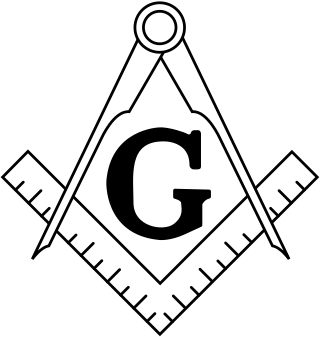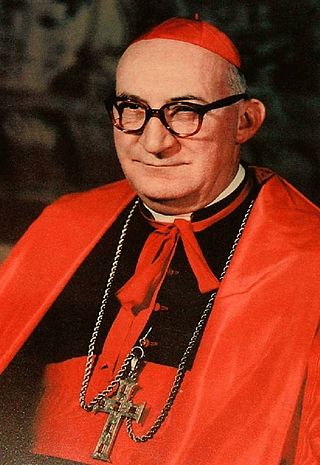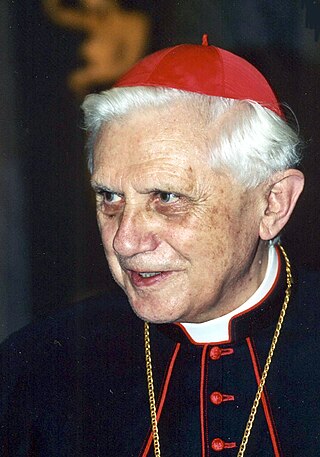Related Research Articles

Freemasonry or Masonry refers to fraternal organisations and guilds of stonemasons that, from the end of the 14th century, regulated the qualifications of stonemasons and their interaction with authorities and clients. Modern Freemasonry broadly consists of two main recognition groups: Regular Freemasonry, which insists that a volume of scripture be open in a working lodge, that every member professes belief in a Supreme Being, that no women be admitted, and that the discussion of religion and politics do not take place within the lodge; and Continental Freemasonry, which consists of the jurisdictions that have removed some, or all, of these restrictions.

The Dicastery for the Doctrine of the Faith (DDF) is the oldest among the departments of the Roman Curia. Its seat is the Palace of the Holy Office in Rome. It was founded to defend the Catholic Church from heresy and is the body responsible for promulgating and defending Catholic doctrine.
The relationship between Mormonism and Freemasonry began early in the life of Joseph Smith, founder of the Latter Day Saint movement. Smith's older brother, Hyrum, and possibly his father, Joseph, Sr. were Freemasons while the family lived near Palmyra, New York. In the late 1820s, the western New York region was swept with anti-Masonic fervor.

Humanum genus is a papal encyclical promulgated on 20 April 1884 by Pope Leo XIII.
The Catholic Church first prohibited Catholics from membership in Masonic organizations and other secret societies in 1738. Since then, at least eleven popes have made pronouncements about the incompatibility of Catholic doctrines and Freemasonry.
In eminenti apostolatus specula is a papal bull issued by Pope Clement XII on 28 April 1738, banning Catholics from becoming Freemasons. It arose from Jacobite-Hanoverian rivalry on the continent.

Franjo Šeper was a Croatian prelate of the Catholic Church. He served as prefect of the Congregation for the Doctrine of the Faith from 1968 to 1981, and was elevated to the cardinalate in 1965. Before that, he served as the Archbishop of Zagreb from 1960 to 1969.
Anti-Masonry is "avowed opposition to Freemasonry", which has led to multiple forms of religious discrimination, violent persecution, and suppression in some countries as well as in various organized religions. However, there is no homogeneous anti-Masonic movement. Anti-Masonry consists of radically differing criticisms from frequently incompatible political institutions and organized religions that oppose each other, and are hostile to Freemasonry in some form.
Qui pluribus is an encyclical promulgated by Pope Pius IX on 9 November 1846. It was the first encyclical of his reign and written to urge the prelates to be on guard against the dangers posed by rationalism, pantheism, socialism, communism and other popular philosophies. It was a commentary on the widespread civil unrest spreading across Italy, as nationalists with a variety of beliefs and methods sought the unification of Italy.
The Declaration Concerning Status of Catholics Becoming Freemasons is a February 1981 declaration by the Congregation for the Doctrine of the Faith under Cardinal Franjo Šeper which restated the Catholic Church's prohibition against Catholics becoming Freemasons.
While many Christian denominations either allow or take no stance on their members joining Freemasonry, others discourage or prohibit their members from joining the fraternity.
The Declaration on Masonic Associations is a declaration by the Congregation for the Doctrine of the Faith re-iterating the prohibition of Catholics from joining Masonic organizations. Its Latin title is Declaratio de associationibus massonicis. The document states that Catholics who join Masonic organizations are in a state of grave sin and may not receive Holy Communion. It was issued in 1983 by the prefect of the congregation, Joseph Cardinal Ratzinger, who became Pope Benedict XVI on April 19, 2005.

Joseph Ratzinger (1927–2022) was named by Pope John Paul II on 25 November 1981 as prefect of the Congregation for the Doctrine of the Faith (CDF) formerly known as the Holy Office and, especially around the 16th century, as the Roman Inquisition.
The document On the Pastoral Care of Homosexual Persons, also known by its opening words Homosexualitatis problema, was a pastoral letter authored by the Congregation for the Doctrine of the Faith (CDF) of the Roman Catholic Church addressed to the Bishops of the Catholic Church that was delivered in Rome on 1 October 1986 by Cardinal Joseph Ratzinger and Archbishop Alberto Bovone. The letter gave instructions on how the clergy should deal with and respond to lesbian, gay, and bisexual people. Pope John Paul II approved the letter and ordered its publication. It was designed to correct misunderstandings and misinterpretations of a 1975 CDF letter, Declaration on Certain Questions Concerning Sexual Ethics.
Continental Freemasonry, otherwise known as Liberal Freemasonry, Latin Freemasonry, and Adogmatic Freemasonry, includes the Masonic lodges, primarily on the European continent, that recognize the Grand Orient de France (GOdF) or belong to CLIPSAS, SIMPA, TRACIA **, CIMAS, COMAM, CATENA, GLUA, or any of various other international organizations of Liberal, i.e., Continental Freemasonry. The larger number of Freemasons, most of whom live in the United States–where Regular Freemasonry holds a virtual monopoly–belong to Masonic lodges that recognize the United Grand Lodge of England and do not recognize Continental Freemasons, regarding them as "irregular".
Rosario Francesco Esposito, SSP was an Italian Pauline priest known for joining Freemasonry. He dismissed the Church ban on membership in the Masonic lodge, saying that it is “a thing of the past.”

The Lady of All Nations is a Catholic Marian title sometimes associated with apparitions of the Blessed Virgin Mary to Ida Peerdeman of Amsterdam, Netherlands. Peerdeman claimed to have received 56 visions of the Lady from 1945 to 1959.

Gerhard Ludwig Müller is a German cardinal of the Catholic Church. He served as the Cardinal-Prefect of the Congregation for the Doctrine of the Faith (CDF) from his appointment by Pope Benedict XVI in 2012 until 2017. Pope Francis elevated him to the rank of cardinal in 2014.
The question of whether Freemasonry is anticlerical is the subject of debate. The Catholic Church has long been an outspoken critic of Freemasonry, and some scholars have often accused the fraternity of anticlericalism. The Catholic Church forbids its members to join any Masonic society under pain of interdiction. Freemasons usually take a diametrically opposite view, stating that there is nothing in Freemasonry that is in any way contrary to Catholicism or any other religious faith.
Freemasonry in Spain is first recorded in 1728, in an English lodge. As various papal bulls condemned Freemasonry the Spanish Inquisition did their best to close lodges and demonise Freemasons, therefore the success of Freemasonry from year to year depended on the sympathy or antipathy of the ruling regime. Nevertheless, lodges and even Grand Lodges were formed, and even thrived during more liberal periods. When Francisco Franco consolidated power in 1939, all Freemasonry was banned. In 1979, four years after Franco's death, bans on Freemasonry were declared unconstitutional, and several Grand Lodges and Orients now flourish in Spain.
References
- ↑ "Since many bishops stated in their reply to an earlier survey that confusion had been generated by a perceived change of approach by the Congregation for the Doctrine of the Faith" From Introduction to Letter of April 19, 1985, to U.S. Bishops Concerning Masonry
- ↑ "Cardinal Franjo Seper, then prefect of the Congregation for the Doctrine of the Faith, sent a letter dated July 19, 1974, to Cardinal John Krol, which concluded that "Canon 2335 regards only those Catholics who join associations which plot against the Church." from The Pastoral Problem of Masonic Membership, William Whalen
- ↑ "From 1974 to 1981, and even beyond, an undetermined number of Catholic men joined the Lodge, and many of them retain their membership. Articles in the Catholic press ' told readers that under certain circumstances such membership was now allowed. The general public. Catholic and non-Catholic, got the impression that the Church had softened its stand against membership in Freemasonry." from The Pastoral Problem of Masonic Membership
- ↑ "As late as October 1984, a nationally syndicated columnist for the Catholic press was assuring his readers that Catholics" from The Pastoral Problem of Masonic Membership
- ↑ "principles of Masonry are incompatible with Christian faith and practice whether or not a specific Masonic organization happens to be engaging in activity against the church." From Introduction to Letter of April 19, 1985, to U.S. Bishops Concerning Masonry